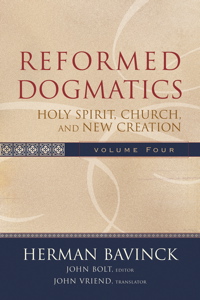
Herman Bavinck
Reviewed by: Mark A. Garcia
Reformed Dogmatics, volume 4: Holy Spirit, Church, and New Creation, by Herman Bavinck. Edited by John Bolt; translated by John Vriend. Published by Baker Academic. Hardback, 944 pages, list price $49.99. Reviewed by OP pastor Mark A. Garcia.
With the release of this splendid volume, the most anticipated Reformed publishing venture in recent memory has reached completion. Now that the full scope of Bavinck’s achievement is in view for English readers, it is easy to see why his work has been praised effusively for generations.
This volume has three major sections. Part One opens with a full discussion of calling and regeneration, and proceeds to careful treatments of faith and conversion, justification, sanctification, and perseverance. This section includes fruitful, sophisticated treatments of various topics, including faith and conversion, varieties of conversion, holiness as gift and reward, sanctification in Christ, good works, and the perfectionist heresy.
Part Two covers the Church’s essence, government, spiritual power, and means of grace, including the proclamation of the Word and the administration of the sacraments. Here we find discussions, not only of discipline, but of mercy, and not only of the manner of baptism, but its benefits.
Part Three covers the intermediate state and the related questions of immortality, purgatory, and “soul sleep.” It includes a wonderful, brief discussion of communion with the church triumphant. Bavinck then turns to the return of Christ, discussing millennial perspectives and questions regarding the place of Israel and the timing and manner of Christ’s return. He deals lastly smith the consummation itself, stressing rightly the uniquely solid position from which Reformed theology is able to address the question of the final salvation of non-Christians and infants. His final words explore the renewal of creation following the final judgment. In connection with the nature of the eternal Sabbath rest into which Christ’s disciples enter (a state, he explains, not of inaction but of joyful service), Bavinck affirms the real and indissoluble connection between what is sown on earth and what is harvested in eternity.
Studying Bavinck puts us in position to appreciate more fully the nature of Van Til’s and Vos’s contributions to Reformed theology, and the three together must confirm in our minds the real benefits that await closer attention to the Dutch Reformed theological tradition of the past hundred years or so. In a work of this size and scope, it should not surprise us to find places here and there where we disagree with Bavinck’s conclusions, or at least wish to put things somewhat differently. For instance, his discussion of the Day of the Lord is enriched considerably by Meredith C. Kline’s work on this day and the consummation. Certainly, however, what few weaknesses one can find do little to affect the magnitude of Bavinck’s achievement.
This is arguably the finest work on systematic theology in the Roformud tradition. We have in Bavinck a model of exemplary clarity, enviable ability, determined clarity, and Reformed catholicity. But how can we tackle such an enormous beast with the little time we have available to us in our hectic daily lives? The brief subsections make for easy daily reading; in fact, with this method you can finish all of Bavinck’s Reformed Dogmatics in under two years. It’s a practice I heartily encourage as a way to gain depth, richness, maturity in one’s life of faith.
April 13, 2025
Suffering: God’s Purpose in Our Pain
April 06, 2025
Sunday Matters: 52 Devotionals to Prepare Your Heart for Church
March 30, 2025
On the Trail with a Missionary
March 23, 2025
Midnight Mercies: Walking with God Through Depression in Motherhood
March 16, 2025
March 09, 2025
Zwingli the Pastor: A Life in Conflict
March 02, 2025
© 2025 The Orthodox Presbyterian Church